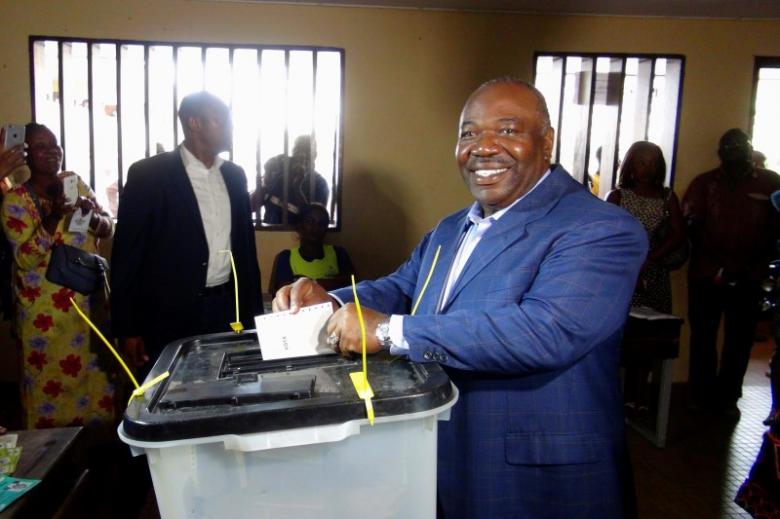No news, they say, is good news. Either that or it’s the result of a government blackout. The draw for the Africa Cup of Nations will be held in Libreville, Gabon, on Wednesday but yet again the buildup to a tournament has been dominated by doubts over where it will be staged as the aftershocks of Gabonese presidential elections continue to reverberate.
At the moment it seems the tournament will go ahead in Gabon, beginning on 14 January, but no one is confident. Even by the standards of the Cup of Nations, the 2017 edition has seemed ill-starred. In 2006, hosting rights were given to South Africa but because of the war in Libya, which was scheduled to host in 2013, the two nations swapped. As the conflict in Libya continued, it became apparent they would have to be replaced altogether as hosts, leading to another round of bidding in 2015 in which Gabon beat Algeria and Ghana; Nigeria, who had initially been named as a reserve host, declined to be considered.
After elections in August gave the incumbent president, Ali Bongo, a narrow victory over his veteran challenger Jean Ping, Gabon descended into violence. Initial results suggested he had won by only 5,594 votes but there were widespread allegations of corruption. Bongo has ruled Gabon since 2009 when he succeeded his father Omar, who had been the president since 1967.
The parliament building and the national television station were attacked by Ping supporters and there were several days of clashes on the streets between the opposition and police. The government acknowledged three people were killed in the protests but the opposition has said the figure could be as high as 50. There were also several hundred arrests. Social media was suspended and a moratorium imposed on the issuing of visas to foreign journalists. The Confederation of African Football discussed the unrest and sounded out Morocco as a replacement host; it had been supposed to host the 2015 tournament before withdrawing at the last minute because of fears over Ebola.
The Gabonese supreme court investigated the election result and concluded Bongo had won by 11,000 votes. Bongo has sworn in a new cabinet and, for now, everything appears relatively calm, although the state budget for 2017 has been cut by 5% because of the falling oil price. The possibility remains the tournament could be used as a platform for dissent by the opposition, particularly in Oyem and Port Gentil, host cities in areas that strongly backed Ping.
The tournament looks fascinatingly open and, as has been the recent way of things, is missing a number of big names. Most strikingly, for the third time in four tournaments, there is no Nigeria. They were perhaps a little unfortunate Chad’s withdrawal denied them the chance to qualify as a best runner-up, but they took only a point from two games with Egypt and could only draw away to Tanzania. South Africa miss out for the third time in five tournaments after finishing third in their group behind not only Cameroon but also Mauritania. Angola complete the set of recent World Cup qualifiers not to make it, and there is no place either for the 2012 champions Zambia or for Cape Verde, Congo or Ethiopia, all of whom have enlivened recent tournaments.
There is a welcome return for the most successful side in the competition’s history, Egypt, who under the former Valencia manager Héctor Cúper have qualified for the first time since competing a hat-trick of successive titles in 2010. They lurk ominously in seeding pot three which also comprises Cameroon, Senegal and Morocco and, as such, looks rather more likely to produce a winner than pot two, where Tunisia, Mali, Burkina Faso and DR Congo have benefitted from decent runs at recent tournaments.
Another side making a long-awaited comeback are Uganda who have qualified for the first time since being beaten in the final by Ghana in 1978. They are joined in Pot four by Togo, Zimbabwe and the debutants Guinea-Bissau, who finished top of a qualifying group comprising Congo, Zambia and Kenya with a goal difference of zero.
Last time they (co-) hosted the tournament, in 2012, Gabon reached the quarter-final where they lost on penalties to Mali. Borussia Dortmund’s Pierre-Emerick Aubameyang, who missed the decisive kick, is more experienced and a more rounded player now and it’s not impossible, with home support and a solid midfield, that they could go further.
Ghana have a squad based around the side who won the Under-20 World Cup in 2009, Algeria have a fine crop of attacking players but are looking for a coach after Milovan Rajevac walked out after two games in charge and Ivory Coast, the defending champions, have paradoxically blossomed as the so-called golden generation have begun to retire.
The first decade of the 21st century witnessed the domination of two great sides, Cameroon and Egypt, but since 2010, no side has been on top. Two of the last three winners have not qualified. It feels as though any of about 10 sides could win in Gabon. Whether that is the result of a general lifting of standards, or whether the absence of a great team is evidence of a general lack of quality is open to debate but what is certain is how competitive and unpredictable the 2017 Cup of Nations will be. We are not even entirely certain where it’s going to be.
(The Guardian)
